Clean Energy Tool
Reliable, consistent and digestible information for investment in clean energy projects around the world.
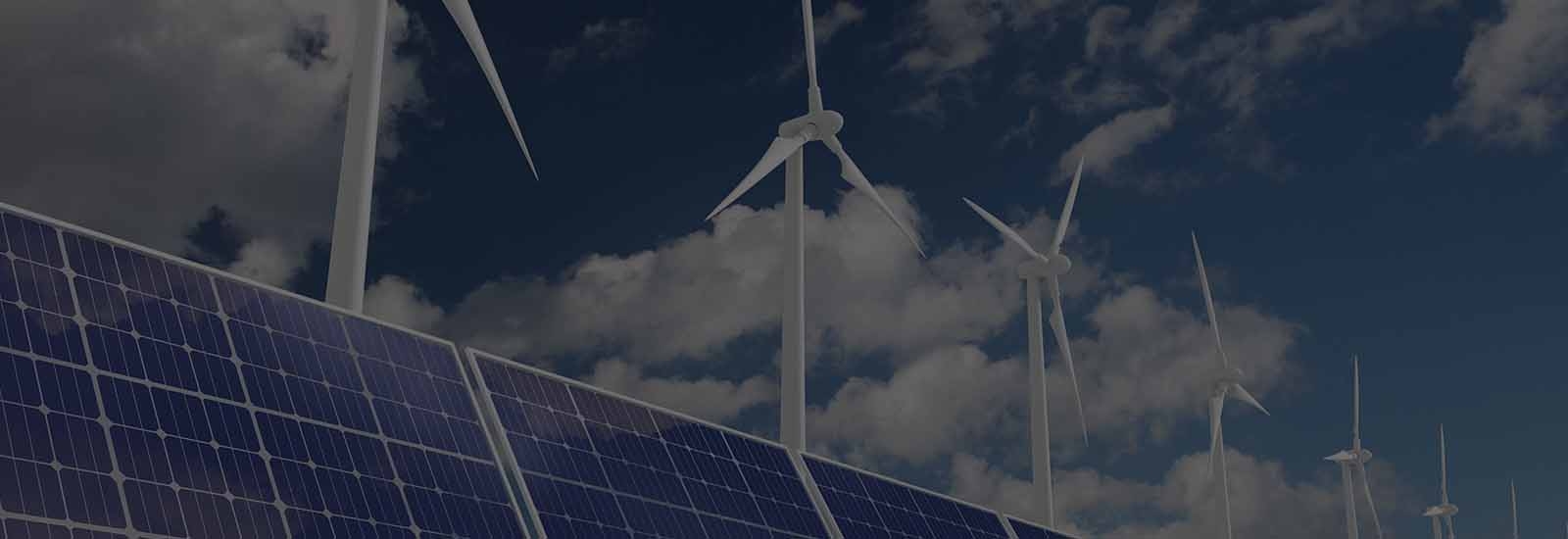
Reliable, consistent and digestible information for investment in clean energy projects around the world.

Renewable energy payments in Ukraine:
steady progress amid escalating debt
As of early September, the Guaranteed Buyer SE had fulfilled 42.1% of its financial obligations for renewable energy payments. A consistent trend has been observed in recent months, with the payment rate to green energy producers reaching nearly 53.5% for the majority of October.
However, by the end of November 2023, Ukrenergo NEC’s debt to the Guaranteed Buyer SE had increased from UAH 29.9 billion to UAH 32.18 billion. This rising debt trend is critically impacting the renewable energy sector by affecting the financial capabilities of Guaranteed Buyer SE, resulting in producers receiving only about 50% of their expected payments for this year.
The accumulation of these debts is partly attributable to delayed payments from various market participants. To address this issue, Volodymyr Kudrytskyi, the CEO of Ukrenergo NEC, has proposed an increase in Ukrenergo's tariffs coupled with rigorous enforcement of timely payments across the market.
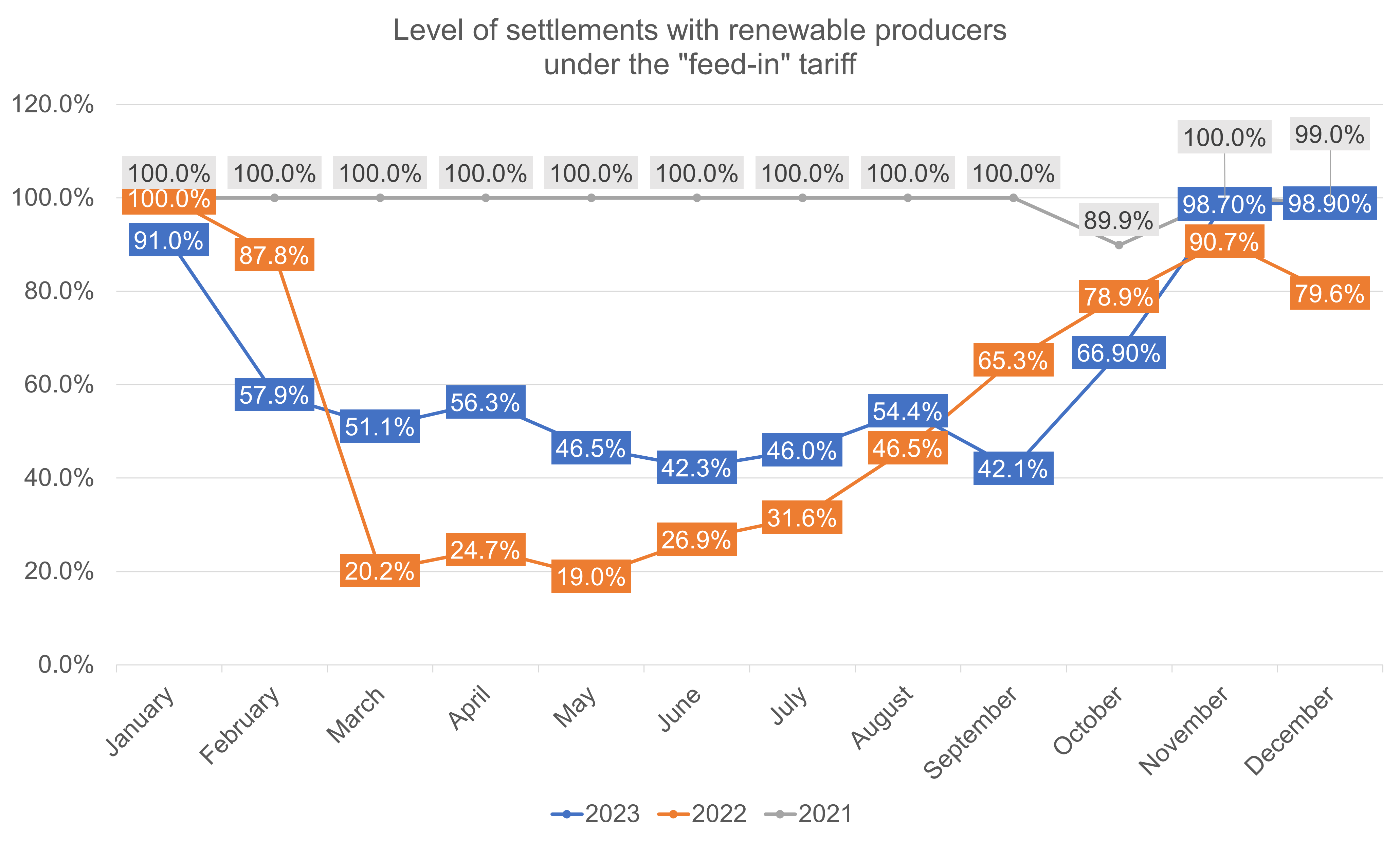

New tariffs for electricity transmission
The National Energy and Utilities Regulatory Commission (NEURC, the Regulator) has decided that the tariff for electricity transmission services for system users (except for green steel producers using electricity) for 2024 will be UAH 528.57/MWh (~ EUR 13.3, excluding value added tax).
Meanwhile, for electricity consumers that (1) produce steel and whose carbon dioxide emissions do not exceed 250 kilograms per 1 tonne of production,
(2) produce steel with an electric arc furnace method only, the transmission tariff is UAH 364.7/MWh (~ EUR 9.18, excluding value added tax).
The transmission tariff remains the main source of payments for renewable energy producers benefiting from the feed-in tariff, hence, stable income from the tariff is crucial for maintenance of the proper settlement schedule with electricity producers using renewable sources. Ukrenergo gives its assureances that the increase in the final cost of electricity for business and industry will not be significant, and that the increase will not exceed 1-2%, or 0.10 UAH/kWh (~ EUR 0.0025).
In addition, the tariff for dispatch (operational and technological) management services will also increase. For all users, without exception, it will increase by 9.5% next year and amount to UAH 104.57/MWh (~ EUR 2.63, excluding value added tax).
Ukraine's path to integrating its electricity market with the EU and Moldova
On 25 October, the USAID Energy Security Project and EPEX SPOT introduced a roadmap to help Ukraine connect its electricity market with the European Union and Moldova. This plan is part of Ukraine's effort to reform its electricity market. It is intended to provide guidance for important Ukrainian energy organizations, including the National Energy and Utilities Regulatory Commission, NPC Ukrenergo, the Market Operator, and the Ukrainian Energy Exchange, as they undertake this big step. This initiative is a continuation of their ongoing efforts to build capacity for electricity market coupling, marking a significant move towards integrating Ukraine with European energy markets.
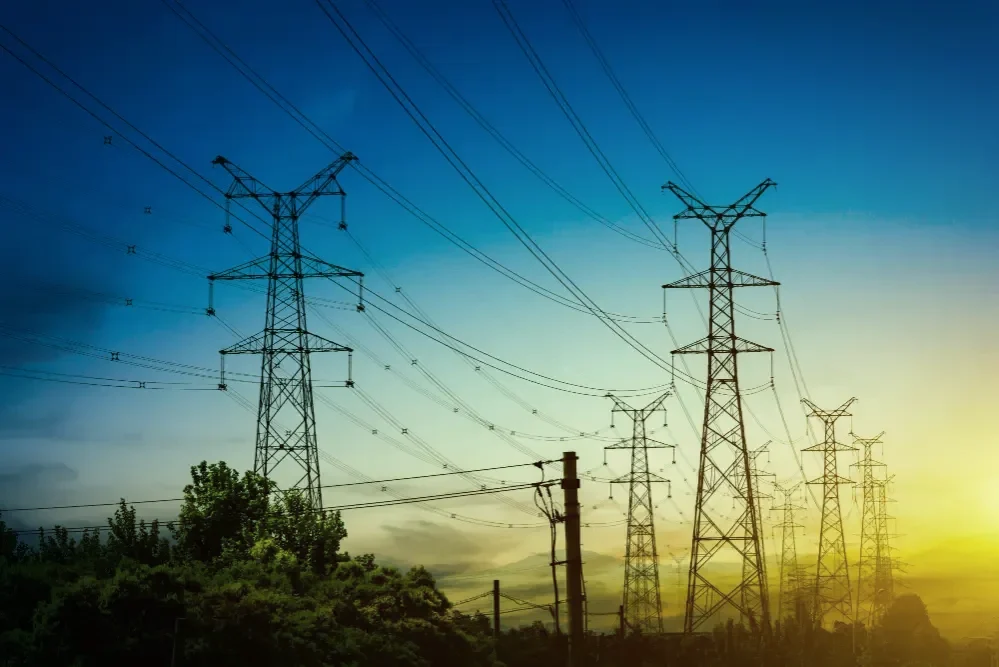
The roadmap transitions from theory to practice, focusing on clear deliverables and timelines. The initial regulatory phase establishes the project's foundation, defining roles and obligations, including designating a Nominated Electricity Market Operator and establishing cross-border capacity rules. The legal phase then outlines project and operational planning across different levels, crucial for the legal and operational framework involved with market coupling.
At its core, the technical phase addresses integrating bidding zones like Ukraine and Moldova, demanding intense IT coordination due to technical complexities that are involved. The subsequent go-live phase involves monitoring the market coupling's benefits post-launch to assess their impact.
The organization phase concludes the roadmap, emphasizing effective planning and target-setting for stakeholder efficiency. The roadmap, a dynamic guide, outlines the actions, sequence, and responsibilities for all parties, aiming to ensure a smooth integration of Ukraine’s electricity market with those of the EU and Moldova.
Ukrenergo has received full member status in the ENTSO-E
NPC Ukrenergo has become a full member of the European Network of Transmission System Operators for Electricity (ENTSO-E). On January 1, 2024, the Ukrainian power system operator became the 40th full member of the association.
Ukrenergo's membership in ENTSO-E opens a new stage of cooperation between Ukrainian and European power system operators as equal participants in the European energy space.
NPC Ukrenergo will have access to all the rights and assume the obligations of a full ENTSO-E member. Most importantly, it will have the right to vote during the meetings of the ENTSO-E General Assembly and the Board, i.e. it will be able to influence the adoption of strategic decisions on the functioning and development of the European electricity grid.

Increase in the electricity import capacity from the European Union
ENTSO-E decided to increase the transmission capacity for Ukraine to import electricity from the European Union from 1.2 GW to 1.7 GW beginning December 1, 2023. This decision enabled Ukraine to strengthen its energy security.
"With the onset of colder weather, the enemy has intensified attacks on our energy infrastructure. In such conditions, having reserves and the ability to import larger volumes of electricity from EU countries is an important tool to support the energy system and its resilience," noted the Minister of Energy of Ukraine, Herman Halushchenko.
Ukrainian – Poland cross-border capacity will be distributed through joint-actions on the JAO platform starting from January 18, 2024
On December 23, 2023 JAO reported that Daily Allocation Rules for Poland-Ukraine border will enter into force on 16 January 2024, which will enable the commencement of auctions for the allocation of the cross-border capacity at daily auctions. The commencement of commercial daily auctions for the Ukrainian-Slovak and Ukrainian-Hungary borders was not announced however; this is expected in 2024.
Ukraine moves to introduce electricity origin from renewable sources guarantees
On 8 November 2023, the Cabinet of Ministers of Ukraine published the first version of the draft resolution On the Introduction of Guarantees of Origin for Electricity Generated from Renewable Energy Sources. This draft resolution seeks to establish a framework for issuing, trading, and redeeming guarantees of origin for electricity derived from renewable energy sources. Additionally, it outlines a method for assessing the environmental value of such electricity.
It's important to note that while the concept of guarantees of origin for electricity from alternative energy sources has been part of Ukrainian law since 2013, it has never been implemented in practice. The new draft resolution is set to overhaul the existing legislation completely.

Thus, according to the draft resolution, the register of guarantees of origin of electricity produced from renewable energy sources provides for the formation of a guarantee of origin, accounting for information on the issuance, circulation, redemption, and cancellation of guarantees of origin. Access to the register is provided via the Internet.
A guarantee of origin is valid for 12 calendar months from the date of generation of the amount of electricity for which the guarantee of origin was issued. After this period, the guarantee of origin is not subject to further circulation and may be redeemed within six calendar months.
If the guarantee of origin of electricity is not redeemed within 18 calendar months from the date of production of the amount of electricity for which the guarantee of origin was issued, the guarantee of origin shall be cancelled.
The holder of the guarantee of origin has the right to consume the guarantee of origin for the purpose of:
- confirmation that the goods, works, or services produced/performed/provided in whole or in part were produced/performed/provided using electricity generated from renewable energy sources;
- confirmation that the electricity produced by the generating plant and consumed for its own needs comes from renewable energy sources.
On November 29, the second revised version was published on the website of the Cabinet of Ministers, however, as of December 31 2023 the regulation has not been finally adopted.
The NEURC approves amendments to the Transmission System Code
On December 29, 2023, the NEURC adopted a resolution, On Approval of Amendments to the Transmission System Code to implement the provisions of Law of Ukraine No. 3220 On Amendments to Certain Laws of Ukraine on the Restoration and Green Transformation of the Energy System of Ukraine.
The amendments address the following issues:
- peculiarities of connection (installation, connection) of consumer generating units in their own electrical networks;
- technical requirements for the operation of a new electricity market participant - an aggregator;
- the procedure for connecting (installing, connecting) the user's storage facilities in their own electrical networks has been improved;
- terminology was brought in line with the requirements of the Law of Ukraine No. 3220;
- clarified the settlement procedure for dispatch control services and electricity transmission services by users, ensuring that settlement of relevant contractual relations is in accordance with Law of Ukraine No. 3220, etc.
According to the NEURC, the specified regulatory norms of the Transmission System Code are aimed at stimulating the development of renewable energy, which is one of the priorities of Ukraine's state policy in the electricity sector and a tool to ensure the security of the state.
State Fund for Decarbonisation and Energy Efficient Transformation launches January 1, 2024
On January 1, 2024, a law establishing the State Fund for Decarbonization and Energy Efficient Transformation, which was adopted by the Verkhovna Rada in the spring of 2023, came into effect.
Ukraine is applying the European ”polluter pays” approach for the first time in a long time, as stipulated by the EU regulation on energy management and climate action. Large industrial companies will bear the majority of the ecological impact tax on CO2 emissions, which will be used to replenish the fund. It is worth mentioning that the National Revenue Strategy until 2030, published on December 8, 2023, provides for an increase in the CO2 emissions tax that is scheduled to take effect in the post-war period. According to the National Revenue Strategy, excess profits of electricity generating companies as well as excise duty on electricity are also considered as prospective source of income for the state budget. However, the strategy contains no specific plans or suggestions with respect to said taxes and duties.
In addition to the ecological impact tax, the fund will be replenished by government loans to support energy efficiency and carbon emissions reduction.
The funds of the State Fund for Decarbonization and Energy Efficient Transformation will be used to provide:
- financial support for measures and state-targeted programs in the field of energy efficiency, increasing the use of renewable energy sources and alternative fuels, as well as the reduction of carbon emissions;
- financial support for the compensation, reimbursement, and reduction of obligations of individuals and legal entities under loan and leasing agreements concluded for the implementation of energy efficiency measures, introduction of energy services, increased use of RES and alternative fuels, as well as the reduction of carbon emissions;
- fulfilment of debt obligations created by loans received by the state for the implementation of investment projects in the field of energy efficiency, increased use of RES and alternative fuels, as well as the reduction of carbon emissions.

The first Regional Office of Decarbonization and Energy Efficiency in Ukraine
Ukraine has taken a significant step towards sustainable development by establishing its first regional office for decarbonization and energy efficiency in the Dnipropetrovsk region. This initiative, born from a partnership between the State Energy Efficiency Agency and local governing bodies, embodies Ukraine's commitment to environmental progress and energy resilience. The office is set to play a crucial role in aiding communities to become more energy-efficient and integrating advanced technologies and innovations into reconstruction efforts.
The mission of this new office is to champion energy independence and foster low-carbon development across the region. It aims to form a team of skilled energy managers dedicated to leading these transformative efforts.
The office's key focus areas include managing energy consumption effectively, building a regional "energy security cushion," securing financial resources for energy-efficient transformation within the region, and raising education and awareness about energy efficiency. In addition to being a hub for cooperation, this office will offer benefits like budget savings, improved schools and hospitals, job creation, and more competitive business environments and is a vital step in Ukraine's journey towards a greener and more sustainable future.

Ukraine launches an ambitious renewable energy integration plan for enhanced grid flexibility and sustainability
In preparation for participation in the Renewable Energy Integration Program, a draft Investment Plan for Ukraine was developed in October 2023.
Ukraine's Investment Plan (IP) for the Climate Investment Funds (CIF) Renewable Energy Integration Program (REI), guided by the Ministry of Energy and supported by the World Bank, the European Bank for Reconstruction and Development, and the International Finance Corporation, is designed to enhance the flexibility and resilience of Ukraine's power system. This plan addresses challenges in integrating and expanding renewable energy, with a goal to effectively incorporate these sources into Ukraine's national energy mix.
Among the expected outcomes, CIF-REI financing will address the most imminent grid constraints to facilitate integration of Variable Renewable Energy through the deployment of battery storage capabilities and will facilitate additional resources from the public and private sectors to meet these needs flexibly. The expected outcomes of Ukraine's IP for the CIF Renewable Energy Integration arise from the construction of new battery storage capacities, and encompass a wide range of benefits, including:

Denmark continues its active support for Ukraine’s energy sector
Denmark and the Danish Energy Agency have been consistently involved in programs to help rebuild Ukraine's energy sector. This includes their role in the Ukrainian-Danish Energy Partnership Program (UDEPP), which provides aid for the reconstruction of the Mykolaiv region and other areas of Ukraine, and their contributions to the Ukraine Energy Support Fund.
A significant initiative in this partnership is the creation of the emergency сatalogue of technological solutions for energy generation, presented by Denmark and published on the Danish Energy Agency's website. The catalogue lists key technological solutions suitable for implementation in Ukraine to enhance distributed energy generation. It is designed to help energy companies, regional authorities, and municipalities find the most appropriate solutions for the Ukrainian setting, thereby improving energy supply security. Additionally, the catalogue aims to facilitate the attraction of investment and donor support for the immediate restoration and development of Ukraine's energy infrastructure.
Italy-Ukraine Memorandum on Energy Transition
The Ministry of Energy of Ukraine and the Ministry of Environment and Energy Security of Italy have agreed to cooperate in the field of energy transition and renewable energy sources at COP28, the 28th UN Climate Change Conference.
The memorandum envisages cooperation in the following areas of interest:
- Technology transfer and capacity building in the renewable energy and energy efficiency sectors;
- Exchange of best practices and knowledge in the energy transition and innovative technologies in the decarbonisation process;
- Accelerating the deployment and use of renewable hydrogen, clean biogas, and biomethane;
- Strengthening public participation and sharing best practices in energy system management, including the revision of the National Energy and Climate Plan (NECP).
EIB provides €133 million to strengthen resilience of Ukraine’s hydropower plants
Ukrhydroenergo received a EUR 133 million tranche from the European Investment Bank. It was distributed within the context of a program whose main goal is to reconstruct 21 hydroelectric units at stations in the Dnipro River basin. The efforts will focus on replacing critical equipment, boosting operational reliability, and enhancing the efficiency and resilience of hydroelectric power plants along the Dnipro River. This includes work at the Kyiv PSP, Kaniv, Kremenchuk, Kakhovka and Serednyodniprovska Hydroelectric Power Stations, as well as Dnipro Hydroelectric Power Station (DniproHES)-1 and Dnipro Hydroelectric Power Station (DniproHES)-2. Earlier, the European Investment Bank allocated EUR 67 million to finance the existing project, which was fully utilized in mid-2022.
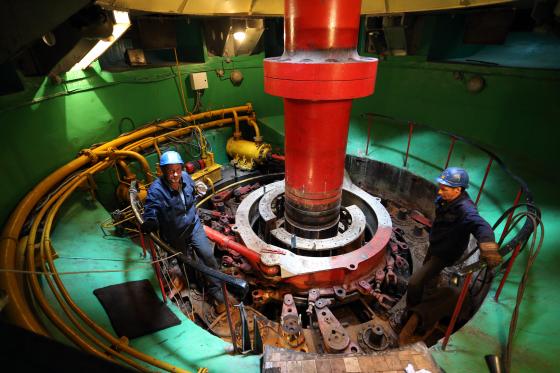
German government and the EIB provide €20 million grant to support Ukraine’s energy transition
Germany’s Federal Ministry of Economic Affairs and Climate Action (BMWK), the European Investment Bank (EIB), and Ukraine’s Ministry for Restoration have agreed on their intention to conclude a EUR 20 million grant from the Renewable Energy Solution Programme.
The grant will promote the introduction of renewable energy technologies in Ukrainian municipalities (schools, hospitals, kindergartens) and increase the energy independence of public institutions, in particular through the integration of solar energy systems, as well as the use of biomass, geothermal heat pumps, and the installation of batteries.
Thus, it is expected that the Renewable Energy Solution Programme will improve the energy autonomy of critical public buildings and ensure continuity of operations even during power outages caused by Russia's attacks on energy infrastructure.
Energoatom and Westinghouse sign an agreement to buy an AP1000 reactor for the Khmelnytskyi NPP
A contract to purchase equipment for power unit 5 of the Khmelnytskyi Nuclear Power Plant (NPP) has been signed by Patrick Fragman, CEO of Westinghouse Electric Company, and Petro Kotin, President of Energoatom, the state-run company in Ukraine that manages the operation of all nuclear power plants in the country.
"I believe that signing the agreement on the procurement of equipment for AP-1000 power units is an epoch-making event in the development of the national nuclear power industry. The first Western power unit in Ukraine will add more than 1,000 MW in capacity and strengthen the nation’s energy independence," Petro Kotin emphasized.
Ukraine’s Minister of Energy, Herman Halushchenko, added that these reactors are one of the most advanced technologies in nuclear energy, and make it possible to maintain a nuclear plant’s safety systems even in the event of blackouts and the absence of diesel generators or other power systems.
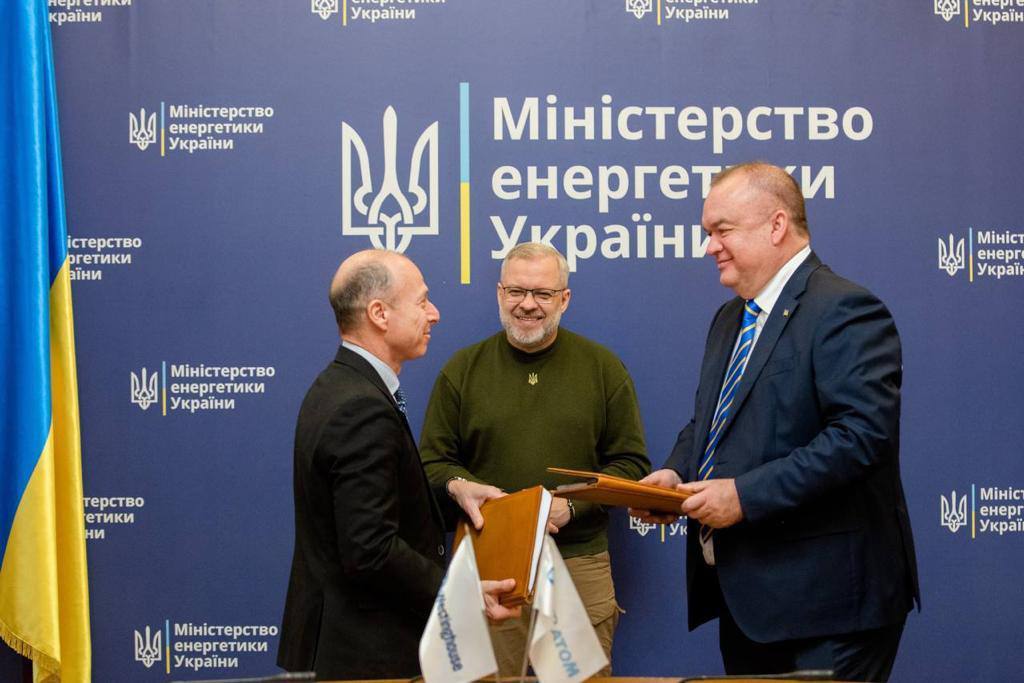
Ukraine adopts a new biofuel registry to boost eco-friendly energy and cut CO2 emissions in the upcoming winter season
Under Presidential Decree No. 737/2023, the Decision of the National Security and Defence Council of Ukraine, "On additional measures to strengthen the resilience of the energy system and prepare the national economy for operation in the autumn-winter period of 2023/2024," dated 7 November 2023, was approved.
Among other things, it emphasizes amendments to Ukraine’s legislation to create a registry of installations using biofuel as their sole fuel type. The creation of this registry, inter alia, is a necessary component for implementing the bill’s provisions to establish a zero-hryvnia rate of environmental tax for carbon dioxide emissions from installations that emit such gases as a result of burning biofuel.

sophisticated solutions for businesses on their way to carbon neutrality
WE HELP WITH